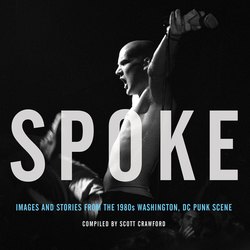Читать книгу Spoke - Scott Crawford - Страница 5
На сайте Литреса книга снята с продажи.
ОглавлениеThere was nothing extraordinary about growing up just outside of Washington, DC, in the 1980s. But head south a few miles down Georgia Avenue into the heart of the city and you were at the epicenter of one of the country’s most vibrant punk scenes—the birthplace of bands like Minor Threat, Bad Brains, Government Issue, Scream, and others. When I discovered at the age of twelve that these bands were playing in my backyard, my world changed. I was a skinny, nonathletic kid who wasn’t particularly good at anything. So, much like I had with comic books and B movies before, I hunted down everything I could find on the subject—which at that point consisted of fanzines and a few record-store clerks who would answer my endless barrage of questions. It was that geeky preoccupation that led me to start a photocopied fanzine called Metrozine in 1984. Published from my mother’s kitchen table, it exposed me to a community that encouraged innovation, insurrection, and a DIY approach to life. At that point, anything (and everything) seemed possible.
This was always a story that I wanted to tell, and yet when I reflected on it, so much of it seemed like a Technicolor dream filled with cigarette smoke, feedback, sweat, and my own adolescent angst. It wasn’t until I approached middle age that I was able to start to wrap my head around how deeply the scene impacted me and informed so many of the decisions that I’d made in my life. That’s what led me to start filming Salad Days—a documentary told ostensibly through my eyes, but ultimately through the voices that were there and/or inspired by the DC punk scene throughout the 1980s. Shortly after hatching the idea, I reached out to my longtime photographer friend Jim Saah (whose iconic photos of that period appear in the film and in this book)—like me, he was inspired by the music and the aesthetic of the DC community, and we began work on Salad Days shortly thereafter.
As you can imagine, trying to cover every band and every personality was nearly impossible within the confines of a hundred-minute documentary film. With that in mind, I reached out to Akashic Books with the goal of exploring many of the bands featured in the film in a little more detail and in their own words. Over the course of almost four years, we interviewed over a hundred people for Salad Days—and from those I culled many of the quotes that you see here. There were a few band members who chose to not be included—some thought they had little to add, while others had mixed feelings about their own experiences.
One thing I was constantly reminded of while making the movie was just how young we were. It’s important to acknowledge that much of what we experienced was filtered through an adolescent lens—filled with self-doubt and a still-developing worldview—a fact particularly noteworthy given how self-assured and technically proficient much of the music was. It also helps explain some of the misconceptions (and misperceptions) of the era.
Much like the film, this book seeks to take a chronological look at the musicians who helped shape the DC scene throughout the decade. While Spoke covers many of the bands in the film, it certainly doesn’t include all of the musicians, artists, photographers, writers, and entrepreneurs who made the community come alive. I encourage you to seek out more information from sources like the DC Punk Archive (dclibrary.org/punk), the DC Punk and Indie Fanzine Collection (http://hdl.handle.net/1903.1/26175), and books like Banned in DC, Dance of Days, and Hard Art, for additional insights into what made the city so special.
Although both the movie and this book examine the past, neither is meant to serve as some kind of misty-eyed scrapbook. In the words of author/activist Mark Andersen, “Our salad days weren’t then, they’re now. They’re always now.” —Scott Crawford
Scott crawfoRd, DC Space, DC, 1985 (JenN izza Fox-thomas)
